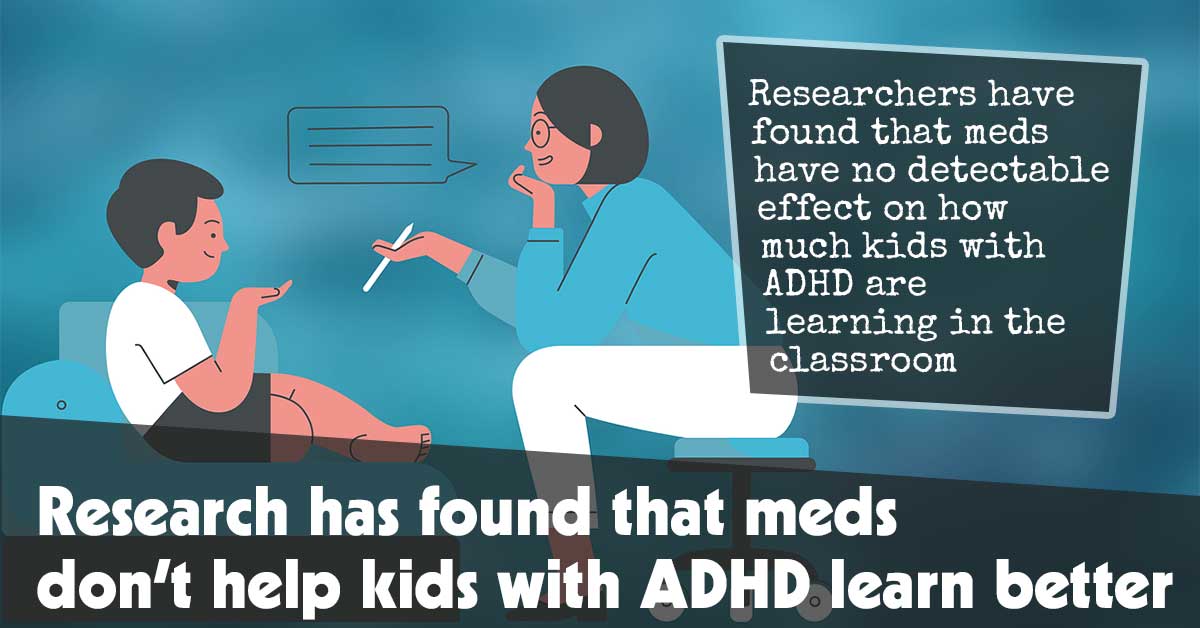For decades, the majority of medical practitioners, teachers, and parents have assumed that stimulant meds help kids with ADHD learn better. Researchers have however found that meds have no detectable effect on how much kids with ADHD are learning in the classroom.1✅ JOURNAL REFERENCE
DOI: 10.1037/ccp0000725
About 10% of kids in the U.S. are identified as having ADHD and over 90% of kids are prescribed stimulant meds as the primary treatment method in school environments since the majority of medical practitioners believe that medication will lead to improved academic achievement.
Educators and medical practitioners have held the belief that meds help kids with ADHD learn because more seatwork is completed and more time is spent on-task when they are medicated. The researchers however found that meds had no effect on learning of curriculum content.
The researchers assessed 173 kids with ADHD between the ages of 7 and 12 taking part in an extensive 8-week summer camp program for kids with ADHD and associated learning, emotional, and behavioral challenges.
They completed 2 consecutive stages of 25-minute instruction every day in vocabulary and subject-area content in social studies and science. The instruction given to each student throughout the 3-week stages was at their established grade level. The material was taught by certified teachers and assistants to groups of 10 to 14 kids in a classroom environment.
Each child was randomized to receive a stimulant medication throughout either the 1st or 2nd of the instructional stages, and receiving a placebo throughout the other stage.
The researchers observed that kids learned the same amount of vocabulary content, social studies, and science whether they were receiving the meds or the placebo.
Although meds didn’t improve learning, it was revealed that meds helped the kids improve their behavior in the classroom and complete more seatwork. When taking meds, 37% more arithmetic problems were completed each minute, and 53% fewer classroom rule violations were committed each hour.
Also, consistent with previous research, it was found that meds helped to improve test scores slightly when meds were taken on a test day, but not enough to improve the majority of children’s grades. As an example, meds helped the kids increase by 1.7 percentage points on average out of 100 on social studies and science tests.
Improving academic results is significant for kids with ADHD because in comparison to their peers, kids with ADHD have more off-task classroom behavior, obtain lower test scores, and receive lower grades.
They are also more likely to be held back for a grade, drop out before graduating, and be given special education services. Poor academic performance is one of the most debilitating impairments linked to ADHD, often resulting in the long-term financial and vocational problems that characterize adult ADHD.
Prior research has shown that behavioral therapy is cheaper and more effective for treating kids with ADHD compared to meds. Stimulant meds are more effective as a 2nd-line supplemental treatment option for kids who require it and also at lower dosages than usually prescribed.
Research has found repeatedly that behavioral treatment is best for kids with ADHD since they, their parents, and teachers learn strategies and skills that will help them in succeeding long-term at home, at school, and in relationships.
Medicating kids doesn’t solve the problem, it just temporarily removes the symptoms. Families should rather focus on behavioral treatments 1st and add meds only if necessary.
Academic and behavioral treatments that improve functional impairment meaningfully in the long-term for youngsters with ADHD include classroom-based tools for management such as a daily report card, parent training, and academic achievement-specific school services which include special individualized education plans and 504 education plans.



